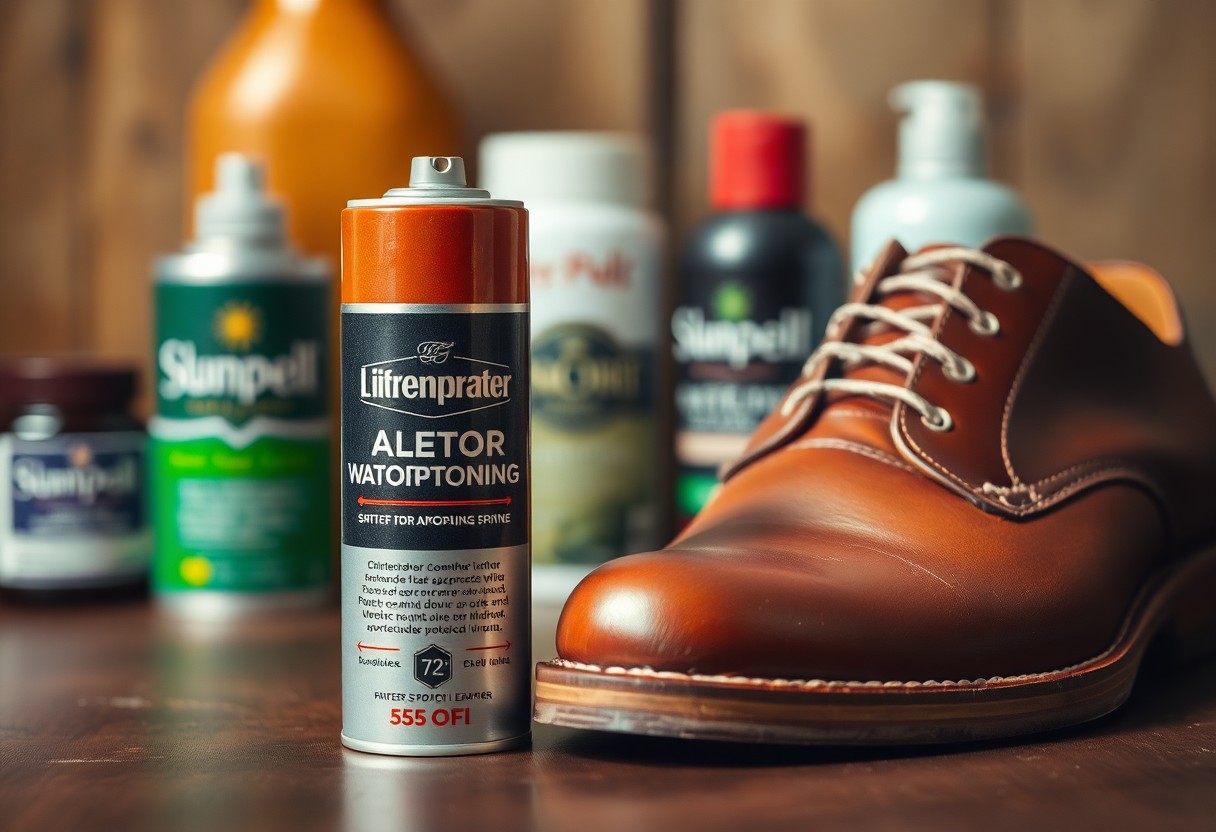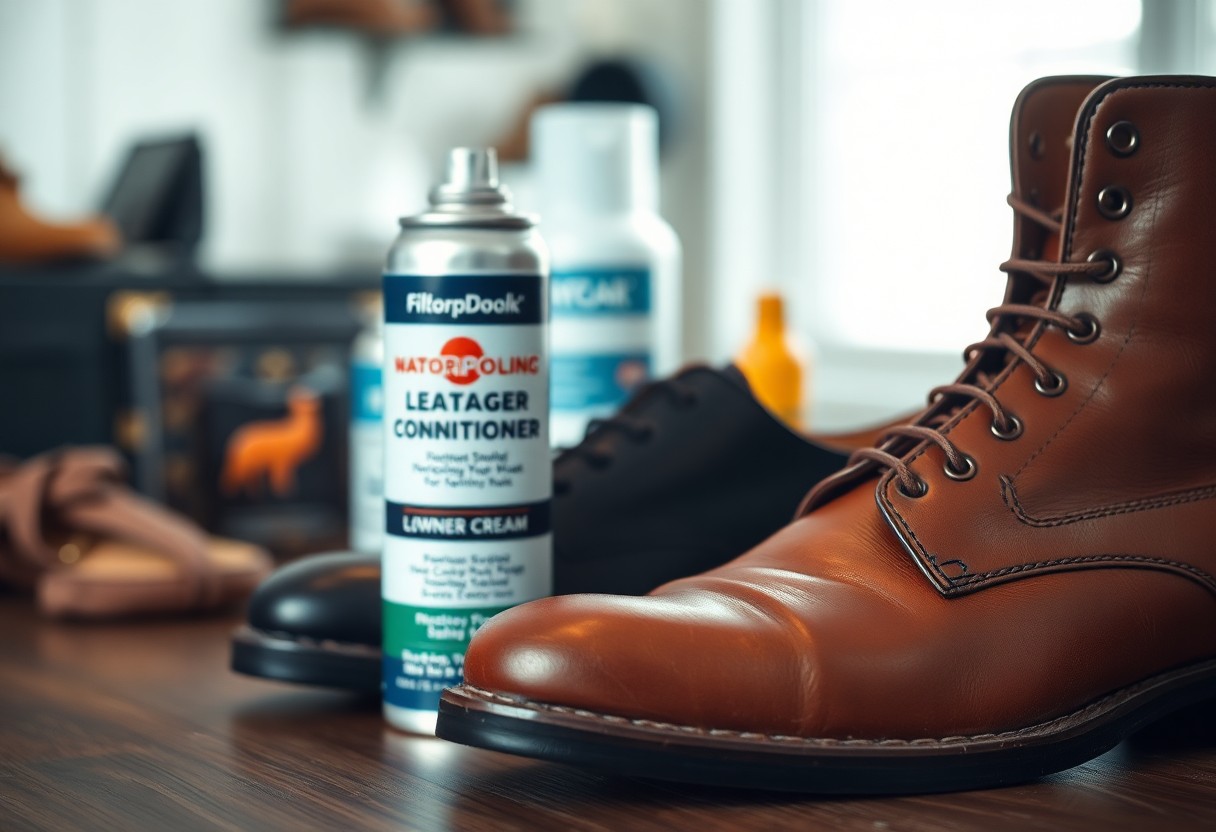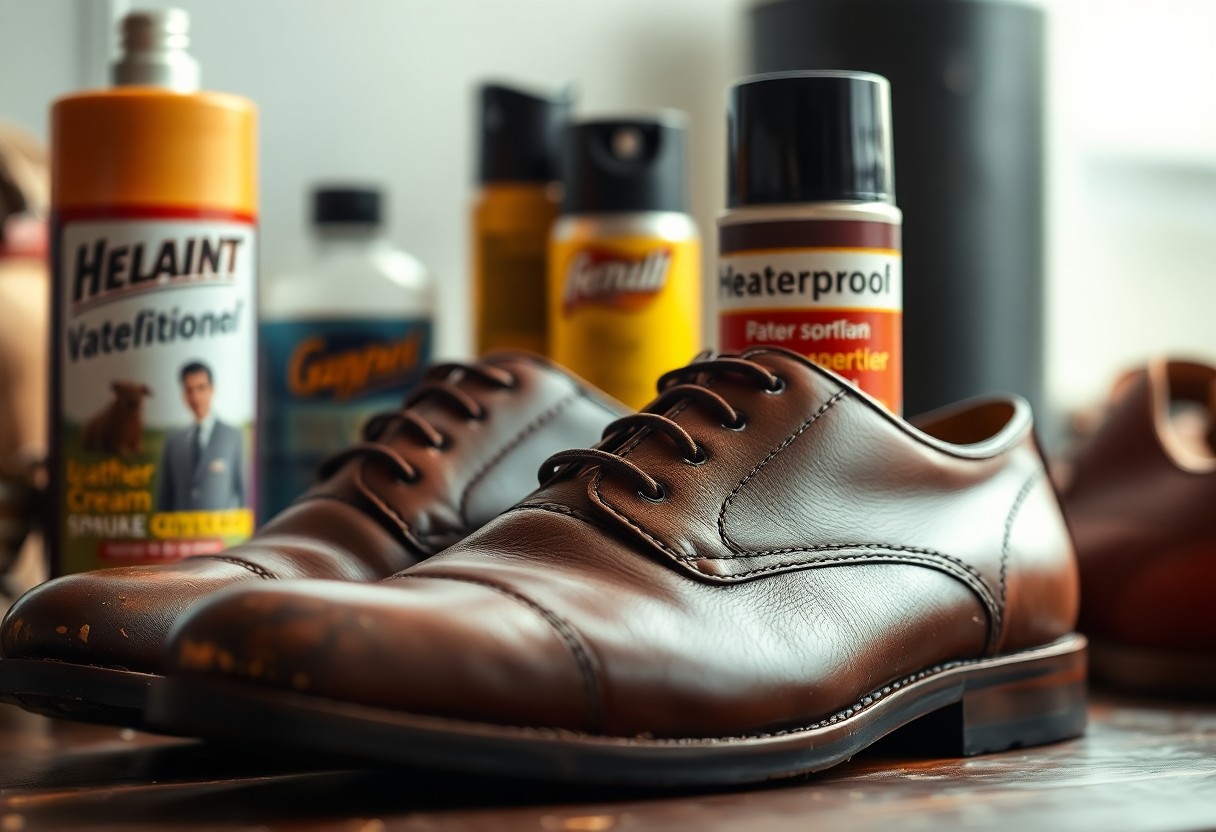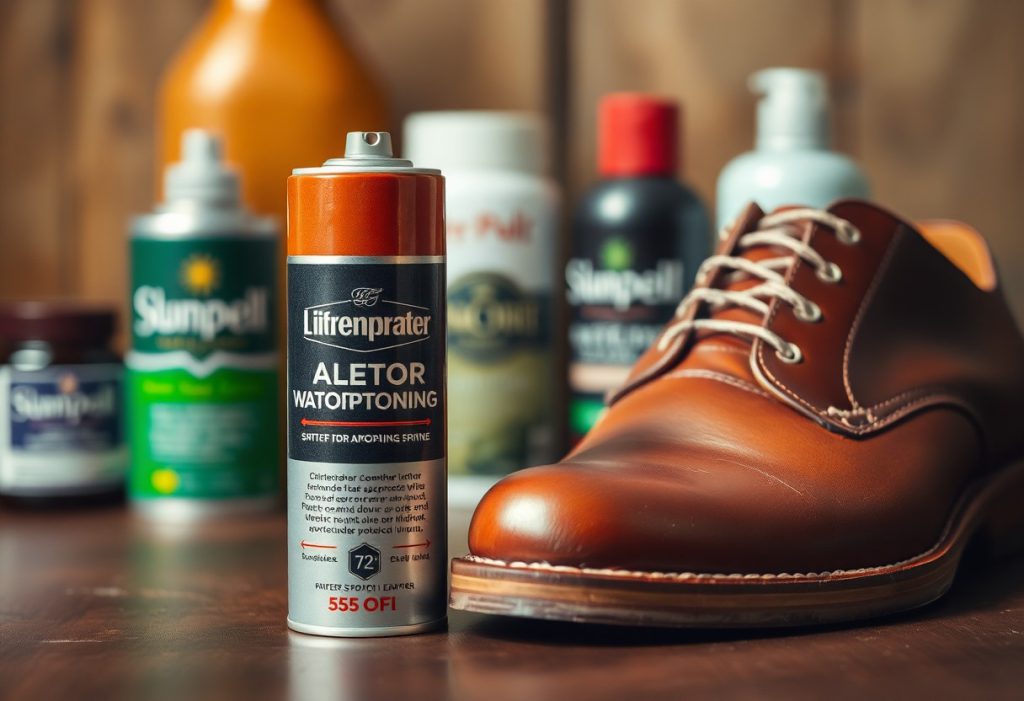Leather care mistakes can lead to irreversible damage to your valuable footwear. One common mistake is the application of waterproofing spray on smooth leather. While these sprays might seem like a quick fix to protect your shoes, they can block essential nutrients from nourishing the leather, ultimately causing it to dry out and crack over time. Smooth leather shoes have built-in natural water-resistant properties, and they require proper nourishment through shoe creams and waxes to maintain their durability. Instead of relying on sprays, opt for high-quality leather conditioners and wax polishes that not only protect but also nourish the leather, ensuring its longevity and preserving its natural qualities.
Essential Strategies for Effective Leather Protection and Longevity
To ensure the longevity of your leather items, it’s vital to understand their inherent protective characteristics. Full grain leather features natural water-resistant properties thanks to its tightly woven fiber structure. However, these qualities require consistent and diligent maintenance to remain effective. The durability of your leather is closely linked to the care it receives. Utilizing waterproofing sprays can restrict the leather’s ability to breathe, leading to significant damage over time if not addressed properly. By recognizing the needs of your leather, you can greatly enhance its lifespan.
Discovering the Exceptional Advantages of Full Grain Leather
After the tanning process, full grain leather retains its original surface layer, offering unmatched natural protection. Items made from this material maintain an intact grain layer, which provides resistance against water and wear. This top layer is rich in natural oils and fibers that form a protective barrier, rendering additional waterproofing sprays unnecessary and potentially harmful to the leather’s health. Embracing the natural properties of full grain leather is essential for preserving its beauty and functionality.
Understanding How Leather Regulates Moisture and Ages Gracefully
Grain leather must retain its ability to absorb and expel moisture effectively. The pores within your leather enable it to breathe and manage moisture, keeping it supple and preventing unsightly cracks. However, the application of waterproofing sprays can seal these pores, restricting vital airflow and disrupting the natural moisture balance. As leather ages, it requires appropriate nourishment through conditioning products. When waterproofing sprays are applied, they create a barrier that blocks essential conditioning oils from reaching the leather, leading to dryness and brittleness over time. Regular application of leather cream is crucial for allowing your leather to age beautifully, developing a rich and desirable patina.

Understanding the Risks Associated with Waterproofing Spray Usage
Many individuals mistakenly believe that waterproofing spray is the ultimate solution for protecting their leather shoes. This prevalent practice can lead to serious damage to your footwear. While these sprays add an immediate protective barrier against water, they simultaneously block essential nutrients from penetrating the leather, paving the way for potential long-term deterioration. Understanding this balance is critical for effective leather care.
Debunking Common Misconceptions Driven by Marketing Myths
Thanks to aggressive marketing tactics and well-meaning advice from shoe store staff, you may be under the impression that waterproofing spray is necessary for all types of leather shoes. This misconception has been perpetuated by numerous shoe retailers, largely due to the high profit margins and frequent re-purchase rates associated with these products. However, the reality is that regular smooth leather possesses natural protective qualities that do not necessitate additional spray-on barriers for effective safeguarding.
Evaluating Immediate Benefits Against Long-term Consequences
The damage to your leather shoes begins when waterproofing sprays form a barrier that hinders essential oils and conditioning agents from penetrating the leather. Although you may notice improved water resistance initially, the truth is that your leather will gradually become dry and brittle without the vital nourishment it requires. The ramifications of using waterproofing sprays on smooth leather go beyond superficial protection. Your leather requires consistent nourishment to maintain its flexibility and durability. When shoe creams and conditioners are unable to permeate the leather due to the spray barrier, the material risks cracking and deterioration, significantly shortening your shoes’ lifespan. Natural waxes and appropriate conditioning provide superior long-term protection while nurturing the leather’s health.

Delving into the Science Behind Effective Leather Care Practices
A critical aspect of successful leather care is understanding its molecular structure. The collagen fiber networks within your leather shoes require both protection and nourishment. The products you apply can either coat these fibers or penetrate them. This interaction is vital for the long-term health of your leather footwear. By making informed choices, you can ensure your leather remains in excellent condition.
Recognizing the Importance of Regular Nourishment for Leather
It’s essential to understand that your leather shoes require consistent nourishment to maintain their quality. The natural oils present in your leather shoes help prevent cracking and sustain flexibility. Over time, these oils can diminish due to regular wear and exposure to various environmental conditions. To safeguard the leather’s structural integrity, it’s crucial to replenish these oils through diligent conditioning. This practice ensures your footwear remains comfortable and visually appealing.
Understanding the Barrier Effects Caused by Waterproofing Sprays
A significant drawback of waterproofing sprays is their tendency to create a barrier. When applied to smooth leather, these sprays form an impermeable layer that obstructs both water and essential nutrients. This barrier prevents your leather care products from effectively penetrating the surface, causing a gradual decline in the leather’s quality over time. Maintaining an effective care routine is paramount.
The barrier effect of waterproofing sprays creates a problematic cycle for your shoes. While these sprays efficiently block water, they also inhibit the absorption of conditioning products that are essential for maintaining the leather’s health. As a result, the leather may appear protected on the surface but is actually becoming dehydrated and brittle underneath. Silicone-based sprays are particularly harmful, as they create a permanent barrier that is difficult to remove without damaging the leather.
Implementing Proven Strategies for Effective Leather Protection
Contrary to common beliefs, your smooth leather shoes require specific care techniques that align with the natural properties of full-grain leather. The optimal approach combines traditional methods with products designed to enhance the leather’s inherent protective qualities, ensuring both immediate defense and lasting durability for your footwear. Tailoring your care regimen to the specific needs of your leather will yield the best results.
Utilizing the Benefits of Wax-based Solutions for Leather Care
An effective alternative to waterproofing sprays is the use of premium wax-based products. These solutions work in harmony with your leather’s natural grain rather than against it. The application of wax polish forms a protective barrier that still allows the leather to breathe, making it especially advantageous for toe caps and areas subject to heavy wear. By choosing the right products, you can enhance the longevity of your shoes.
Boosting Leather Quality Through Regular Cream and Conditioner Application
Unlike conventional spray treatments, leather creams and conditioners provide essential nourishment while preserving the leather’s natural protective capabilities. Your shoes benefit from oils that penetrate deeply into the material, helping to prevent drying and cracking. Moreover, consistent application of cream and conditioner creates a cumulative effect that enhances leather quality over time. The natural oils found in these products bolster the leather’s flexibility and strength, allowing it to develop a beautiful patina. It’s recommended to apply these products every 4-6 wears to sustain optimal leather condition.

Identifying Appropriate Situations for Waterproofing Spray Application
In contrast to smooth leather, certain materials greatly benefit from waterproofing sprays. These products create an effective water-resistant barrier on specific materials that lack inherent protection. Waterproofing sprays are especially useful for suede, nubuck, and various textiles, where the material structure does not provide natural moisture resistance. Understanding the right application is key to effective leather care.
Enhancing Suede and Nubuck Durability with Waterproofing Spray
By treating your suede or nubuck footwear with waterproofing spray, you significantly enhance their resistance to moisture damage. Although many contemporary suede materials come pre-treated with factory waterproofing, additional protection can help sustain this defense over time. The application of spray establishes a protective barrier that effectively prevents water from penetrating these delicate materials, ensuring their longevity and aesthetic appeal.
Providing Optimal Protection for Textile Footwear Against Water Damage
In addition to leather options, textile footwear requires specialized protection against water damage. Materials such as canvas, mesh, and synthetic fabrics can achieve improved water resistance through proper spray application. Most textile materials are naturally absorbent, making them vulnerable to water damage and staining. By using waterproofing sprays designed for textiles, you can help retain the shape and color of your shoes. The barrier they create also prevents dirt and debris from embedding themselves in the fabric fibers. It’s advisable to reapply the spray every 3-4 months for optimal protection, depending on the frequency of use and prevailing weather conditions.
Expert Insights and Recommendations for Effective Leather Care
Not all leather treatments yield the same results. Experts in leather care strongly recommend against using waterproofing sprays on smooth leather. Your full-grain leather shoes require specialized care that allows them to breathe and absorb nourishing treatments. Using inappropriate products can cause leather damage that could cost hundreds of dollars. Ensuring that you apply the right products is essential for maintaining your investment.
Valuable Guidance from Tannery Specialists on Leather Maintenance
To maintain the quality of leather, tannery specialists stress that full-grain leather naturally possesses water-resistant properties in its outer layer. Preserving the leather’s protective qualities requires the application of oils and waxes. Waterproofing sprays can block these essential treatments from penetrating the leather, leading to potential long-term damage.
Professional Cobblers’ Advice for Maximizing Leather Longevity
For the long-term care of leather, professional cobblers advocate for the use of wax-based products rather than waterproofing sprays. Your shoes will thrive with treatments that both protect and nourish the leather. Data indicates that 90% of premature leather damage arises from the use of incorrect care products. By following proper leather care practices, your shoes could last an impressive 15-20 years instead of just 2-3 years with inadequate maintenance. Traditional wax treatments enable leather to retain its natural qualities while providing sufficient moisture protection, ensuring your investment in high-quality leather footwear is met with meticulous care practices that uphold both aesthetic appeal and durability.
Key Takeaways for Optimal Leather Care Practices
In summary, your smooth leather shoes require appropriate care that avoids waterproofing sprays. Instead, opt for shoe creams and waxes that nourish the leather while providing effective water protection. Full-grain leather inherently boasts natural protective qualities due to its grain layer, and waterproofing sprays may obstruct essential oils from permeating the leather, leading to dryness and cracking. Save waterproofing sprays for suede, nubuck, or textile footwear where they can be most effective. By choosing the right products, you can protect your leather shoes while ensuring their longevity for years to come.
Your Leather Care Questions Answered: Expert Advice
Q: Why is waterproofing spray detrimental to smooth leather shoes?
A: Waterproofing spray creates a barrier on leather that prevents essential oils and conditioners from penetrating the material. While it provides water protection, it also obstructs the necessary nourishment of the leather, leading to dryness and potential cracking over time, ultimately diminishing the lifespan of the shoes and requiring more frequent replacements.
Q: What alternatives should I consider instead of waterproofing spray on smooth leather shoes?
A: Consider using a combination of shoe cream and wax polish instead. Shoe cream supplies essential oils to nourish the leather, while wax polish forms a protective layer that helps repel water. This method works in harmony with the natural protective properties of full-grain leather, maintaining the leather’s health while offering effective water resistance. This approach prolongs the life of your footwear significantly.
Q: Which types of footwear can I safely apply waterproofing spray to?
A: Waterproofing spray is appropriate for materials like suede, nubuck, and textiles. These materials lack the natural protection found in smooth leather and thus benefit from the barrier created by waterproofing sprays. Many modern suedes and nubucks may already have factory waterproofing treatments, but additional applications can enhance and sustain this level of protection, ensuring your footwear remains in prime condition.
The Article Why you shouldn’t use waterproofing spray on regular smooth leather and better alternatives appeared first on My Shoes Finder
The Article Waterproofing Spray on Smooth Leather: Risks and Alternatives Was Found On https://limitsofstrategy.com
The Article Waterproofing Spray Risks and Alternatives for Smooth Leather First Appeared ON
: https://ad4sc.com


